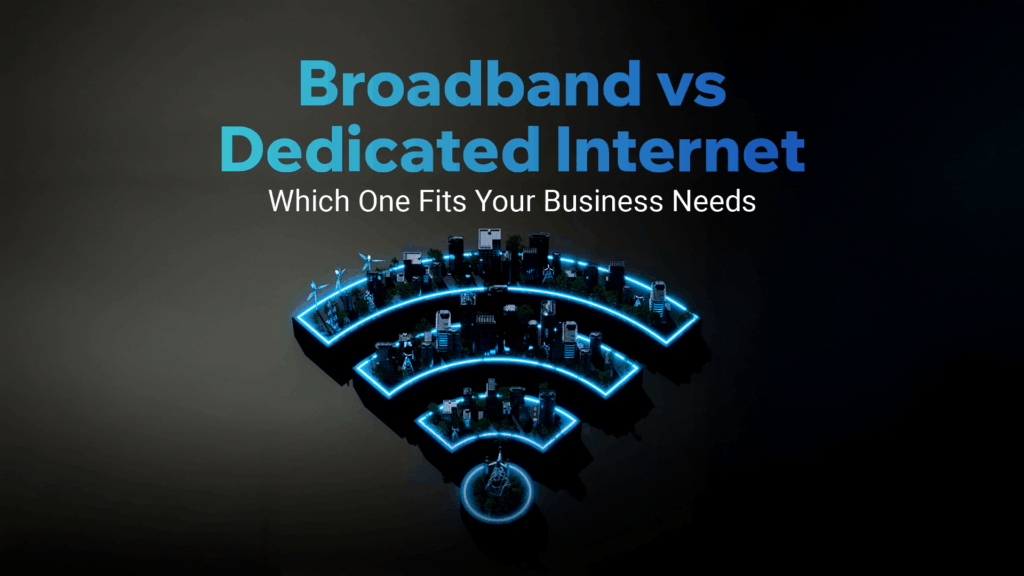
The internet is the lifeblood of modern business operations. Choosing the wrong type of connection can throttle your productivity and limit your growth. Business owners often face a critical choice: the budget-friendly Broadband Internet or the premium Dedicated Internet Access (DIA).
This article provides an in-depth comparison of both services based on crucial business factors, helping you make the right decision for your company’s future.
Understanding the Core Differences
Before diving into the features, it’s essential to understand how these two types of connections operate.
What is Broadband Internet?
Broadband is a high-speed internet connection primarily designed for residential use or very small businesses (SOHO).
- Shared Connection: The key characteristic of Broadband is that it uses a shared bandwidth (often a 1:N ratio). You share the connection with other users in your local area, meaning speeds can fluctuate wildly during peak times when your neighbors are also online.
- Asymmetrical Speed: Broadband is typically asymmetrical, meaning the download speed is much faster than the upload speed. This is sufficient for basic activities like browsing and downloading but poor for high-volume data uploads or hosting services.
- “Best-Effort” Service: Providers offer no guarantee on the speed you actually receive; it’s considered a “best-effort” service.
What is Dedicated Internet Access (DIA)?
Dedicated Internet Access is a premium, enterprise-grade connection exclusively for your business.
- Uncontended Connection: DIA is an uncontended (1:1) connection. The entire bandwidth is reserved solely for your organization. This eliminates slowdowns and ensures consistent performance 24/7.
- Symmetrical Speed: DIA is always symmetrical, providing equal upload and download speeds. This is crucial for businesses that frequently transfer large files, use cloud applications, or host servers.
- Guaranteed Service: DIA comes with a Service Level Agreement (SLA), guaranteeing specific performance metrics like uptime and repair times.
Critical Comparison: DIA vs. Broadband for Business
When evaluating which service to choose, you must weigh five critical factors: consistency, upload capacity, reliability, security, and cost.
1. Performance Consistency and Speed
| Feature | Dedicated Internet (DIA) | Broadband Internet |
| 带宽 | Guaranteed and Dedicated (1:1). You always receive the speed you pay for. | Shared (1:N). Speed is variable and drops during peak local usage. |
| Speed Type | Symmetrical. Upload speed equals download speed (100 Mbps up and 100 Mbps down). | Asymmetrical. Download speed is typically much higher than upload speed (100 Mbps down and 10 Mbps up). |
| Latency/Jitter | Very Low and Predictable. Ideal for real-time applications like VoIP, financial trading, and video conferencing. | Higher and Fluctuates. Can cause choppy video calls or poor voice quality. |
For businesses that rely heavily on cloud services, transferring large files, or frequent video collaboration, Symmetrical speeds and guaranteed bandwidth are non-negotiable advantages of DIA.
2. Reliability and Service Level Agreements (SLA)
Reliability is arguably the biggest differentiator. How much does downtime cost your business?
- Dedicated Internet: Comes with a legally binding SLA that guarantees 99.9%or higher uptime and a rapid Mean Time to Repair (MTTR)—often within 4 hours. If the provider fails to meet the SLA, you are often compensated.
- Broadband Internet: Rarely includes a formal SLA. Troubleshooting and repair times are unpredictable and can take days, similar to a residential service. This “best-effort” approach can lead to costly operational downtime for a growing business.
3. Security
A private connection offers a foundational layer of security.
- Dedicated Internet: Since your connection is private, it provides a more secure environment, as you are isolated from other users’ traffic and potential network vulnerabilities. Providers often include enhanced security features like DDoS protection.
- Broadband Internet: As a shared, public network, it presents a higher inherent security risk, as your data travels along the same lines as other users.
4. Cost and Scalability
- Cost: Broadband is significantly cheaper per month, making it attractive for budget-conscious startups. Dedicated Internet is a larger investment, often costing several hundred to a few thousand dollars per month, but the higher price pays for the guaranteed performance and reliability.
- Scalability: DIA is highly scalable. You can easily upgrade or downgrade your bandwidth with the provider as your business expands, ensuring your internet grows with you. Broadband is often limited by the infrastructure available in your specific area.
The Verdict: Which One Should You Choose?
The decision ultimately boils down to two factors: your dependency on the internet and your budget.
Choose Broadband Internet If:
- You are a small office (less than 10 users) or a home-based business.
- Your primary internet use is basic (email, web browsing, light transactions).
- Your budget is limited, and occasional service fluctuations or downtime will not cripple your core operations.
Choose Dedicated Internet Access If:
- You are a medium to large enterprise (more than 15 users).
- You use mission-critical cloud applications (ERP, CRM, large-scale data backup).
- You frequently use VoIP (Voice over IP) or high-definition video conferencing.
- You require fast, consistent upload speeds for transferring large datasets.
- Your business cannot afford downtime—where every hour of outage results in significant financial loss or damage to customer relationships.
In the end, while Broadband may look cheaper, the true cost of unreliability (lost sales, reduced productivity) can make Dedicated Internet the more cost-effective strategic investment for any business committed to growth and operational excellence.
